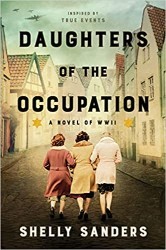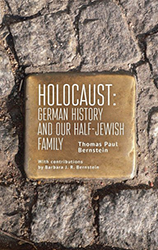Memoirs written by poets and novelists often have a special charm to them, even when they deal with difficult and painful subjects, and Joe Dunthorne’s book, based on his family’s history, takes this a step further, infusing energy and intensity into the narrative and bringing the reader directly into his remarkable adventure.
Dunthorne’s German-Jewish great-grandfather had been a chemist in 1933 in Oranienburg, a small town just outside Berlin, quietly inventing and bringing to market anodyne household items like toothpaste. But the Nazis had different ideas for his talents, and propelled him into their special chemical weapons lab to apply his skill to creating products that were connected to their military goals, products like life-saving gas masks and an increasingly potent set of poisons.
Although he successfully escaped to safety in Turkey with his immediate family in 1935, he left many extended family members behind, only to later learn they had been murdered in Auschwitz.
His guilt at having worked for the Germans never left him, and he put his story down on paper in a long, dark, complex treatise, some of which was written on his deathbed, and it became the major part of the family’s archives. This is the document that Dunthorne found, decades later, and which propelled him to travel to cities across Germany and Turkey to find the true meaning of his relative’s experience. The result is this beautifully rendered personal history, written with mature perspective as well as tenderness, crossing generations and traversing countries to expose the truth beneath the trauma and the travail of his great-grandfather’s life.
Part of the intrigue involves the singular fact that the toothpaste Dunthorn’s great-grandfather invented, and which became a popular item in Germany, contained radium, a chemical that is now understood to be potentially deadly. At the time, though, people thought of it as a wonder element and used it in cosmetics, drank it in soda, and added it to butter and milk, believing in its so-called health-giving properties.
Today, though, when hundreds of unexploded bombs in Oranienburg are still buried in the highly irradiated soil, still emitting alpha particles with every rainstorm, Dunthorne’s story holds particular relevance. He remembers his great-grandfather as a warm, loving grandpa, despite the fact that the man spent much of his life moving into and out of psychiatric hospitals, trying desperately to overcome his self-revulsion at having helped the Nazis.
Nevertheless, Dunthorne’s sensitive handling of this legacy of guilt brings us a searingly honest look inside the minds and hearts of a family with the dark, painful secret of collaboration.
Born in Wales and raised in London, Dunthorne writes in meticulous prose that always invites readers to keep reading. It is warm and at times even radiant, as he writes about family members who touched him profoundly. And in the wealth of photos in the book, he shows the reader their faces, filled with both emotion and information.
The book will appeal to a broad audience: science enthusiasts, Holocaust survivors and their descendants, professionals who study family dynamics, and even those simply looking to learn something new. Dunthorne’s gently self-deprecating approach and his deep and disciplined research combine to make a very satisfying memoir.
Linda F. Burghardt is a New York-based journalist and author who has contributed commentary, breaking news, and features to major newspapers across the U.S., in addition to having three non-fiction books published. She writes frequently on Jewish topics and is now serving as Scholar-in-Residence at the Holocaust Memorial & Tolerance Center of Nassau County.





